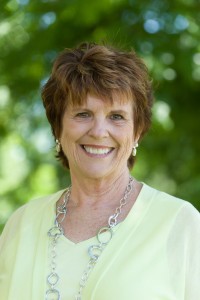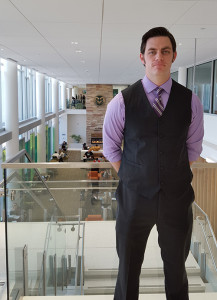Linda Cates arrived at CSU in 1967 as a 21-year-old transfer student from the University of Colorado. She was married with an 18-month-old daughter to support and had no financial means to pay for college other than work-study jobs and student loans.
At the time, no scholarships existed to help nontraditional students. “I certainly could’ve used that kind of financial help,” Cates says.
Instead, she put herself through school while working part-time and found refuge in the Department of Speech Arts (now Communication Studies). Three influential professors — Jack Gravlee, James Irvine and Robert MacLauchlin — inspired her to see a different future for herself.

“Back in 1964 when I graduated from high school, women didn’t have the career choices they have today,” Cates says. “You could be a nurse, secretary, teacher, or stay-at-home mom — that’s all I saw for myself.”
For Cates, the academic rigor, personal attention, departmental camaraderie and mentor encouragement at CSU helped her grow beyond culturally prescribed norms.
She earned her B.A. in 1970 and dove into graduate studies. For the first time ever, she found herself considering the idea of earning a Ph.D. and becoming a college professor. She loved the material she engaged with and the people who opened her eyes to the world. She earned her M.A. in 1972.
After five years of living in student housing and juggling a heavy load of school, work and being a mom, Cates was ready for a break. She found a job teaching speech communication and mass media at the high school level. It helped pay down half the principal on her student loan. Her daughter grew. Cates divorced and remarried. But she stayed committed to education.
The shift in confidence Cates experienced at CSU is something she still speaks about today, and with great pride. “Those men made a true difference in my life,” Cates says. “They made me believe in myself.”
Generations apart
Fast-forward 47 years to Travis Fry. When Fry graduated from high school, the only future the senior communication studies major saw for himself was a military career. “I had never been a really ‘good’ student,” Fry says. “I struggle for grades and have been subpar most of my educational career.”
Fry dealt with undiagnosed and untreated attention deficit disorder as a young student and was often placed in special education alternative learning classes. He grew up hearing that he would never be able to succeed in college. “People within my family, in my peer group, even teachers, they would tender their expectations of me,” he says.
He bought into the rhetoric and decided to follow in the footsteps of other family members who had chosen a life of public service. He was active duty for six of the 10 years he served in the Army National Guard, deploying twice in Iraq, once in Kuwait, and once in South America.

Although Fry wanted to be in special operations, he wound up in an Army aviation battalion and then Medical Evacuation (MEDEVAC) unit installing, configuring and maintaining communications hardware, as well as planning, coordinating, dispatching and tracking MEDEVAC flights. He was often the one to repair communication systems, such as GPS units, while flights were in transit. Then, he’d shift gears and become an assistant to the medic once the plane hit the ground.
It was in the Army that Fry started hearing new rhetoric. “You’re told you can be whatever you want,” he says.
That was a harder message for him to accept, because he didn’t think he had a choice. But more than anything, he became keenly aware that many of the people around him hated their jobs, their families, and their lives. He saw this repeatedly.
“I didn’t want to be this guy volunteering to go to foreign countries to get shot at because it’s better than what’s at home,” Fry says he realized. Instead, he chose to leave the military and go to college.
In 2014 Fry entered CSU as junior transfer student from Front Range Community College majoring in communication studies. “I built a 10-year career out of helping people communicate over digital and encrypted means,” Fry says. “It is really the only world that I knew coming out of the Army.”
Creating new opportunities
Philanthropy is an instinct for Linda Cates, so when the opportunity to support the legacy of her professors presented itself — Gravlee, Irvine and MacLauchlin each have funds endowed in their names — Cates quickly donated. In the late 2000s, she and her husband Bob, a former basketball and baseball student athlete at CSU (’55, ’70), started the process of including CSU in their will.
And then a simple question came their way. “We were asked, ‘Would you feel comfortable giving money now so you can meet the people that you’re impacting?’” Cates says. “The decision to do so opened a whole new world for us.”
The Cates split their giving among their personal interests. Bob supported athletics while Linda supported the Department of Communication Studies by establishing the Linda Cates Scholarship. The scholarship honors the professors and department that supported and encouraged her development as a student and citizen. The scholarship also benefits nontraditional students, an opportunity that wasn’t available when she was in school.
“I think every student who wants to go to college should be encouraged to do so and we should find a way to help them do that,” Cates says. “Chances are, nontraditional students come back to school with a different mindset because they have seen the world in a different light. They realize that education is vital to their being able to make a life for themselves.”
Travis Fry is the 2015-16 recipient of the Linda Cates Scholarship. The journey to winning such an honor has not been easy. He wasn’t accepted to CSU until his third attempt. He attended the University of Northern Colorado for a few unsuccessful semesters before starting classes at Front Range Community College with a 1.6 cumulative GPA. He entered CSU with a 2.3 cumulative GPA.
‘Studentship’
Fry says he’s driven by a work ethic that he calls “studentship.”
“It’s the act of engaging in coursework, talking with professors, and being present for my own educational success,” he says.
Majoring in communication studies has also made a difference. “Communication Studies has helped me view how to be an actively engaged citizen in a democratic state,” Fry says. “It’s helped me view myself very differently. I have a voice. And media allows me to express that voice.”
Fry, age 32, says his biggest challenge as a nontraditional student is relating to most of his classmates. “I am older and have more experience than most of them,” he says. “It’s difficult to see each other as peers.”
Balancing work, school and life has also proved to be tricky at times. “It is almost as if I Iive two lives that are completely different, but most definitely linked,” he says.
Since becoming a Ram, Fry has worked 36 hours a week, taken 15 credits, bought a house with his wife, and set career goals. He hopes to become a marketing and branding specialist. He graduates this May, achieving a 4.0 in his final semester.
“What this scholarship allowed me to do is slow down and really take back an active stance in my home life and work to create a work/school/life balance,” he says.
In 2015-16, Fry also received a Liniger Family Scholarship and an Osher Reentry Scholarship.
Doing more
The giving has only started for Cates. In 2014 she established the Linda Cates Scholarship for Democratic Deliberation in support of the Center for Public Deliberation (CPD), which is housed in Communication Studies. She has also arranged a planned gift that will generate more funding for both the department and the CPD. She also serves on the College of Liberal Arts Development Council… and that’s just at CSU.
Cates serves as president of a local Philanthropic Educational Organization (PEO), which promotes educational opportunities for women through educational loan funds, scholarships, awards and other programming. She also serves as a career and life mentor, empowering young women to advance their lives through education, employment and goal-setting.
“The more you have contact with CSU and the wonderful people there, the more you realize what you can do to help change the world one student at a time,” Cates says. “It’s been the most enriching part of our retirement.”
 To support the Cates or other scholarships for Communication Studies students as part of Colorado State’s $1 billion State Your Purpose campaign, visit the department’s giving Web page.
To support the Cates or other scholarships for Communication Studies students as part of Colorado State’s $1 billion State Your Purpose campaign, visit the department’s giving Web page.